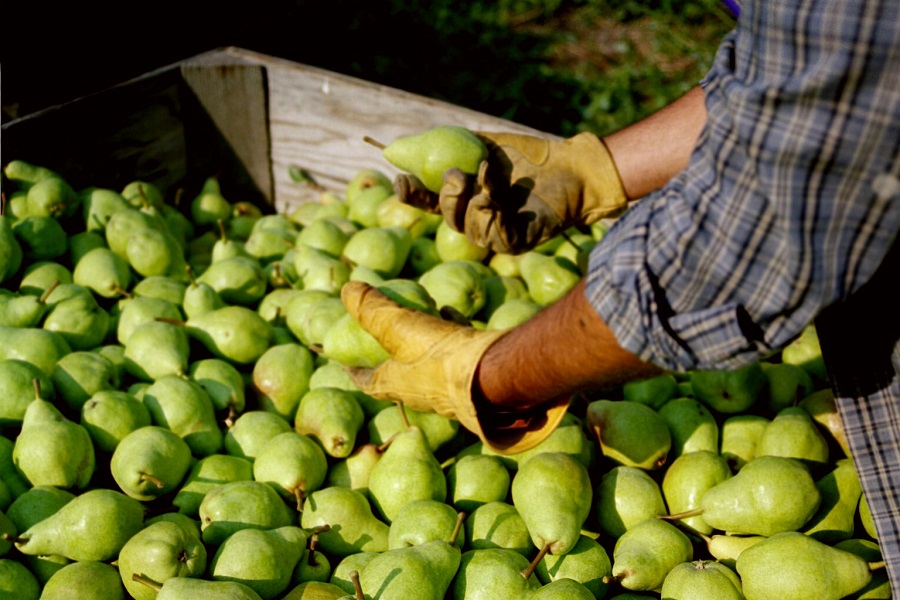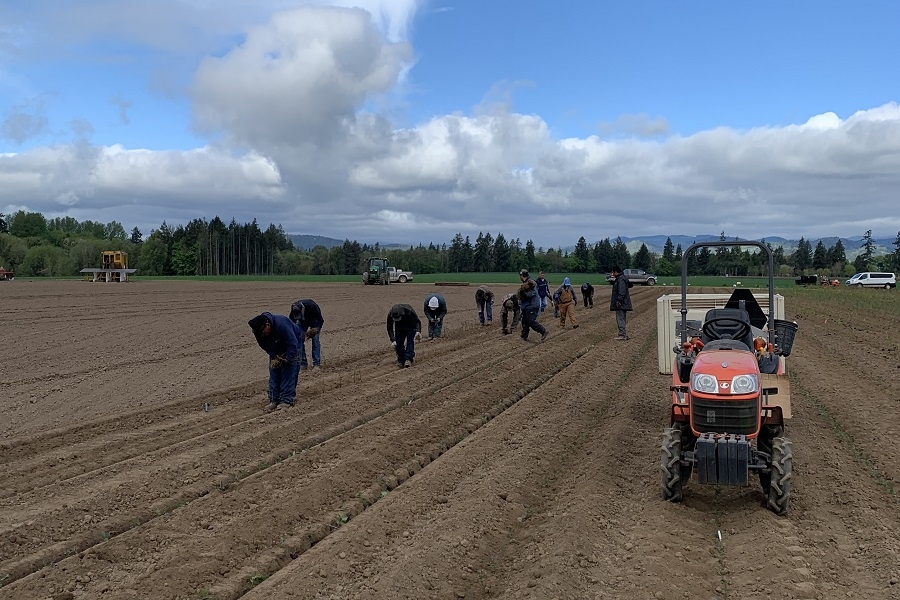Proponents hope tax allowances, a gradual phase-in period and government subsidies will convince legislators to adopt a 40-hour work week for agriculture workers — but farmers say that threshold isn’t realistic.
Oregon legislators are considering a bill this session that would make farmworkers eligible for overtime pay if they work more than 40 hours per week. Farmers’ groups say the 40-hour threshold isn’t realistic — but also that their industry’s longtime exemption is probably on its way out, and compromise is in order.
“We got our growers together for a ‘family meeting’ to talk about what we can live with. We realized saying ‘hell no’ was not going to be the right answer,” says Jeff Stone, executive director of the Oregon Association of Nurseries.
HB 4002, introduced by Rep. Andrea Salinas (D-Lake Oswego), would prohibit agricultural workers from working more than 40 hours per week unless they get overtime compensation — but has longer phase-in period and offers tax credits to subsidize higher farm worker wages.
State and federal laws currently require most employers to pay workers 150% of their hourly rate if they work more than 40 hours per week. But federal law includes a carveout exempting agricultural workers from getting overtime compensation. That exemption dates back to the passage of the Fair Labor Standards Act in 1938, which exempted field workers — then mostly African American — to win the support of Southern Democrats. Today, 83% of farm workers in the U.S. are Hispanic, according to the Department of Labor.

A worker handles pears at Tamura Orchards in Hood River. Credit: ARmomentum.
Oregon had a similar law until 2017, when the legislature repealed it — but failed to introduce new rules requiring overtime pay for farmworkers.
During the 2021 legislative session, Sen. Lew Frederick (D-Portland), introduced a farmworker overtime bill, but it died in committee.
Farm worker advocacy groups, including the Oregon Farm Bureau and Oregon Association of Nurseries (OAN) say the 40-hour threshold is not consistent with seasonal farming requirements, and would make it more difficult for small farms to compete with large agribusiness, which can better absorb the increase in labor costs.

Workers plant pear trees at Tamura Orchards in Hood River. Credit: ARmomentum.
In December, two Oregon farmworkers and the Mano a Mano Family center, filed a petition with the Oregon Court of Appeals, arguing there is no legal reason Bureau of Labor and Industry (BOLI) can’t set an overtime threshold for ag workers.
Lawmakers say the BOLI lawsuit has changed the dynamic around the bill. As Salinas put it, BOLI could theoretically institute farmworker overtime laws “tomorrow.”
Rep. Mark Owens (R-Crane), who is also a farmer, described the lawsuit as a “shot across the bow,” aimed at threatening state lawmakers to pass the overtime bill.
The current draft of the bill includes a five-year phase-in period, which was only three years in the bill’s previous iteration. The new bill also offers a refundable tax credit to farmers equal to 50% of a grower’s overtime pay once the law goes into effect, which would be reviewed again by the legislature after six years.
Salinas says she’s determined to keep the 40-hour threshold, but is planning to meet with farmer advocacy groups to discuss the bill, which had its first reading Tuesday.
“My understanding is that conversations have so far not been productive. We have not had the opportunity to come together and make good policy,” says Owens. “Personally, I don’t like threats.”
Stone says the last version of the bill did not leave enough room for compromise on the 40-hour threshold, which is why it stalled.
“We went from 60 hours to 50 hours. They went from 40 to 40,” says Stone. “They tried to pass it without any of the collaboration we’ve done in the past, and we have shown the ability to cross the divide on this issue. I think what we are asking for is reasonable and realistic.”
Farmers say the 40-hour work week is not consistent with the realities of seasonal farm work — and that the new law would disproportionately hurt small farms, which are not able to absorb the cost.
“The policies that have been presented to us so far all end at a 40-hour threshold with no exception for seasonal harvest time. Our hope is to come out of this with a labor policy for agricultural employees, absolutely, but one that includes flexibility,” says Lesley Tamura, a fourth-generation farmer in Hood River and board member of Columbia Gorge Fruit Growers
“When these sorts of regulations come down, we are the ones who normally get pushed out first,” says Jeff Heater, a cherry and apple grower and member of Columbia Gorge Fruit Growers board of directors, referring to small farmers. “Farming isn’t a one-size-fits-all industry. You have dairies, you have fruit pickers, we operate differently. There shouldn’t be one-size-fits-all regulations.”
Reyna Lopez, executive director of Pineros y Campesinos Unidos del Noroeste (PCUN), a farm workers union, which is advocating for HB 4002, says the 40-hour threshold is not something the workers she represents want to negotiate.
Lopez noted that recent research links farm work to poorer health, including reduced life expectancy; 2015 paper from the University of California specifically recommends ending the overtime exemption for farm workers to improve health outcomes.
But, she adds, she is “very open” to a longer phase-in, as well other compensation which would help family-owned farms better compete with large agribusiness.
“We see this as an opportunity to lean into the conversation about small and mid-sized farms,” says Lopez.
She also says she’s spoken to farm workers who say they won’t return to Oregon to work, instead seeking work in Washington and California, which have already passed overtime pay requirements for farm workers. Oregon farmers have been struggling with labor shortages for several years.
Just seven other states have laws allowing farm workers to be compensated for overtime work. But because the laws are new, there’s not much information about how the rule changes have affected farming in those states. California farmer wages grew 120% in 2019, the first year of its overtime rule’s application, according to data from the California Department of Agriculture. However, California farms with 26 employees or less did not start paying mandatory overtime until 2022. Since then, there have been reports of farmworkers getting around the law by working multiple jobs.
Casey Kulla, a farmer who currently serves on the Yamhill County Commission and who two weeks ago dropped his gubernatorial candidacy in favor of a run for state labor commissioner, says the state has an moral obligation to pay farm workers overtime, but any law requiring overtime pay should be sensitive to needs of small farms.
“Paying farm workers overtime is the right thing to do. Exempting farmworkers from overtime pay has a racist history,” says Kulla “But at the same time, it can also be true that paying overtime will be difficult for farmers who are unable to pivot.”
To subscribe to Oregon Business, click here.









